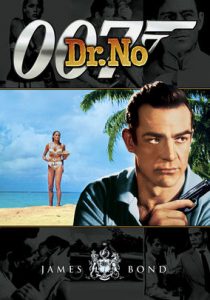Dr. No-1962
Director Terence Young
Starring Sean Connery, Ursula Andress
Top 250 Films #145
Scott’s Review #667
Reviewed July 27, 2017
Grade: A-
Watching the 1962 film that launched the James Bond franchise into the legendary status it has since become, Dr. No is rich in history and a blueprint for what the Bond films would encompass in the decades to follow.
Admittedly, while more essential than the more sophisticated and fleshed-out chapters to come, the film is nonetheless a superb entry in the franchise and a chapter to be cherished on its own merits.
Charismatic Sean Connery, soon to forever be identified in the role of James Bond, fills the role with a masculine confidence oozing from the screen in every scene.
His performance in the role is so seamless that one might assume he had been playing Bond for years rather than being a novice.
And who can forget the character’s first entrance- in a casino, confidently gambling and introducing himself to Sylvia Trench, a character initially slated to be his steady girlfriend?
The film version of Dr. No is adapted from the first Ian Fleming spy novel of the same name, which is clever. As the years passed, the Bond films were modified from the originally written pages, so it is cool and original to have them closely mirror the book.
Lacking a hefty budget, the action is set in London and Jamaica and at Crab Key, a fictional island off Jamaica.
When Strangways, a British Intelligence Chief, is killed and his body taken by assassins known as “the Three Blind Mice,” who also steal files related to Crab Key island, and a mysterious man named “Dr. No,” Bond is summoned to his superior’s (M) office in London and tasked with determining whether the incident has anything to do with radio interference of missiles launching in Cape Canaveral.
Naturally, it does, and the adventure sets off a series of dramatic events involving henchmen, scrapes with death, and Bond’s bedding of more than one beautiful woman before facing the ultimate showdown with the creepy title character., who is missing both hands.
Notable and distinguishable to the film are the fabulous, chirpy, child-like songs featured. From the tuneful, harmonic, nursery rhyme, “Three Blind Mice”, sung calypso style, to the sexy and playful, “Under the Mango Tree”, both are light, yet filled with necessary mystery.
The fact that the former is featured at the beginning and end implies that the same villains are joyfully singing the happy tune, is a good indicator.
Dr. No is also inspired by the introduction of the crime organization SPECTRE, which any Bond fan knows very well and is a staple of the franchise.
As Dr. No, Joseph Wiseman is well cast, though sadly, we only see him in the latter part of the film. Much more character potential is left untouched, though the mystique of knowing the man exists but not what he looks like is worth mentioning.
Admittedly, the assumption that the audience will not be witty enough to realize that Dr. No and Miss Taro (a villainous secretary) are Caucasian actors wearing unconvincing makeup is silly.
Why the choice was made not to cast authentically ethnic actors is unclear. My guess is the powers that be wanted to go a safer route due to the uncertainty of the franchise at that time.
Still, for a first try, Dr. No gets it just about right.
What woman in 1962 was sexier or cast more perfectly than Ursula Andress as the gorgeous and fiery sex kitten Honey Ryder? This casting was spot on, and who can forget her sultry introduction to the film as she emerges from the roaring waves on the beach in a scantily clad bathing suit?
The set designs and locales also work well in the film.
The sets are contemporary, specifically the spacious prison apartment in which Bond and Honey briefly reside. Sleek and sophisticated, the sofa, rug, and tables exude luxury and class.
Dr. No (1962) is a worthy film on its own merits and a fantastic introduction to the world of James Bond and the many trademark elements and nuances that the films contain.
